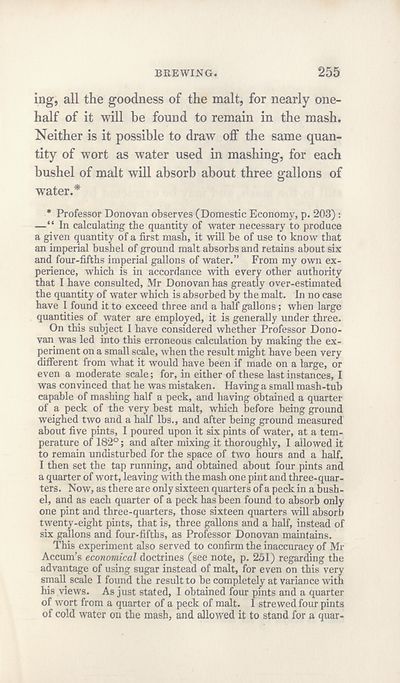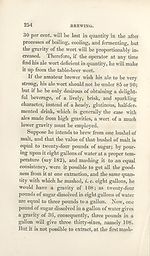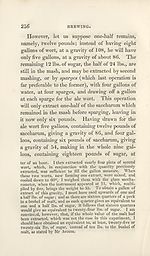Download files
Complete book:
Individual page:
Thumbnail gallery: Grid view | List view

BREWING.
255
ing, all the goodness of the malt, for nearly one-
half of it will be found to remain in the mash.
Neither is it possible to draw off the same quan¬
tity of wort as water used in mashing, for each
bushel of malt will absorb about three gallons of
water.*
* Professor Donovan observes (Domestic Economy, p. 203) :
—“ In calculating the quantity of water necessary to produce
a given quantity of a first mash, it will be of use to know that
an imperial bushel of ground malt absorbs and retains about six
and four-fifths imperial gallons of water.” From my own ex¬
perience, which is in accordance with every other authority
that I have consulted, Mr Donovan has greatly over-estimated
the quantity of water which is absorbed by the malt. In no case
have I found it to exceed three and a half gallons; when large
quantities of water are employed, it is generally under three.
On this subject I have considered whether Professor Dono¬
van was led into this erroneous calculation by making the ex¬
periment on a small scale, when the result might have been very
difierent from what it would have been if made on a large, or
even a moderate scale; for, in either of these last instances, I
was convinced that he was mistaken. Having a small mash-tub
capable of mashing half a peck, and having obtained a quarter
of a peck of the very best malt, which before being ground
weighed two and a half lbs., and after being ground measured
about five pints, I poured upon it six pints of water, at a tem¬
perature of 182°; and after mixing it thoroughly, I allowed it
to remain undisturbed for the space of two hours and a half.
I then set the tap running, and obtained about four pints and
a quarter of wort, leaving with the mash one pint and three-quar¬
ters. Now, as there are only sixteen quarters of a peck in a bush¬
el, and as each quarter of a peck has been found to absorb only
one pint and three-quarters, those sixteen quarters will absorb
twenty-eight pints, that is, three gallons and a half, instead of
six gallons and four-fifths, as Professor Donovan maintains.
This experiment also served to confirm the inaccuracy of Mr
Accum’s economical doctrines (see note, p. 251) regarding the
advantage of using sugar instead of malt, for even on this very
small scale I found the result to be completely at variance with
his views. As just stated, I obtained four pints and a quarter
of wort from a quarter of a peck of malt. I strewed four pints
of cold water on the mash, and allowed it to stand for a quar-
255
ing, all the goodness of the malt, for nearly one-
half of it will be found to remain in the mash.
Neither is it possible to draw off the same quan¬
tity of wort as water used in mashing, for each
bushel of malt will absorb about three gallons of
water.*
* Professor Donovan observes (Domestic Economy, p. 203) :
—“ In calculating the quantity of water necessary to produce
a given quantity of a first mash, it will be of use to know that
an imperial bushel of ground malt absorbs and retains about six
and four-fifths imperial gallons of water.” From my own ex¬
perience, which is in accordance with every other authority
that I have consulted, Mr Donovan has greatly over-estimated
the quantity of water which is absorbed by the malt. In no case
have I found it to exceed three and a half gallons; when large
quantities of water are employed, it is generally under three.
On this subject I have considered whether Professor Dono¬
van was led into this erroneous calculation by making the ex¬
periment on a small scale, when the result might have been very
difierent from what it would have been if made on a large, or
even a moderate scale; for, in either of these last instances, I
was convinced that he was mistaken. Having a small mash-tub
capable of mashing half a peck, and having obtained a quarter
of a peck of the very best malt, which before being ground
weighed two and a half lbs., and after being ground measured
about five pints, I poured upon it six pints of water, at a tem¬
perature of 182°; and after mixing it thoroughly, I allowed it
to remain undisturbed for the space of two hours and a half.
I then set the tap running, and obtained about four pints and
a quarter of wort, leaving with the mash one pint and three-quar¬
ters. Now, as there are only sixteen quarters of a peck in a bush¬
el, and as each quarter of a peck has been found to absorb only
one pint and three-quarters, those sixteen quarters will absorb
twenty-eight pints, that is, three gallons and a half, instead of
six gallons and four-fifths, as Professor Donovan maintains.
This experiment also served to confirm the inaccuracy of Mr
Accum’s economical doctrines (see note, p. 251) regarding the
advantage of using sugar instead of malt, for even on this very
small scale I found the result to be completely at variance with
his views. As just stated, I obtained four pints and a quarter
of wort from a quarter of a peck of malt. I strewed four pints
of cold water on the mash, and allowed it to stand for a quar-
Set display mode to:
![]() Universal Viewer |
Universal Viewer | ![]() Mirador |
Large image | Transcription
Mirador |
Large image | Transcription
| Antiquarian books of Scotland > Occupations > British wine-maker, and domestic brewer > (293) |
|---|
| Permanent URL | https://digital.nls.uk/126003437 |
|---|
| Description | Thousands of printed books from the Antiquarian Books of Scotland collection which dates from 1641 to the 1980s. The collection consists of 14,800 books which were published in Scotland or have a Scottish connection, e.g. through the author, printer or owner. Subjects covered include sport, education, diseases, adventure, occupations, Jacobites, politics and religion. Among the 29 languages represented are English, Gaelic, Italian, French, Russian and Swedish. |
|---|

